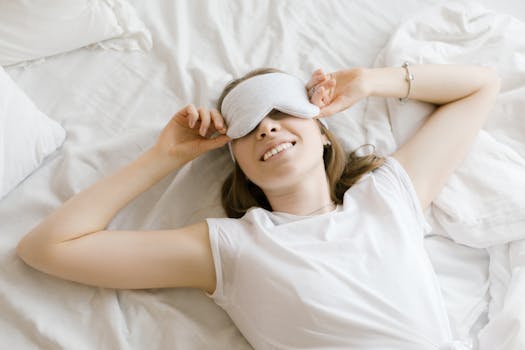
“
Creating a Balanced Sleep Routine for Better Rest
Introduction to Creating a Balanced Sleep Routine for Better Rest

Creating a balanced sleep routine for better rest is essential for our physical and mental health. When we get enough sleep, our bodies can repair and recharge, and our minds can function properly. In this article, we will explore the importance of sleep, the benefits of a balanced sleep routine, and provide tips on how to create a sleep routine that works for you.
Understanding the Importance of Sleep

Sleep is a vital component of our overall health and well-being. During sleep, our bodies repair and regenerate damaged cells, build bone and muscle, and strengthen our immune systems. Sleep also plays a critical role in brain function, with research showing that sleep deprivation can impair cognitive function, memory, and mood.
The Benefits of a Balanced Sleep Routine
A balanced sleep routine can have numerous benefits, including:
- Improved physical health: Sleep helps to repair and regenerate damaged cells, build bone and muscle, and strengthen our immune systems.
- Improved mental health: Sleep helps to regulate our mood, reduce stress and anxiety, and improve our cognitive function.
- Increased productivity: Well-rested individuals are more productive, efficient, and better equipped to handle the demands of daily life.
- Better weight management: Sleep affects our appetite and metabolism, and research has shown that sleep deprivation can lead to weight gain and obesity.
Creating a Balanced Sleep Routine

Creating a balanced sleep routine involves establishing a consistent sleep schedule, creating a relaxing sleep environment, and developing healthy sleep habits. Here are some tips to help you create a sleep routine that works for you:
Establish a Consistent Sleep Schedule
Go to bed and wake up at the same time every day, including weekends. This helps to regulate your body’s internal clock and can improve the quality of your sleep.
Create a Relaxing Sleep Environment
Create a sleep-conducive environment by ensuring your bedroom is dark, quiet, and cool. Consider using blackout curtains, earplugs, or a white noise machine if necessary. Invest in a comfortable mattress and pillows, and keep your bedroom clutter-free and organized.
Develop Healthy Sleep Habits
Avoid stimulating activities before bedtime, such as watching TV, using electronic devices, or engaging in intense exercise. Instead, try relaxing activities like reading, meditation, or deep breathing exercises. Avoid consuming caffeine, nicotine, and heavy meals close to bedtime, as they can disrupt your sleep.
Additional Tips for a Balanced Sleep Routine

In addition to establishing a consistent sleep schedule, creating a relaxing sleep environment, and developing healthy sleep habits, here are some additional tips to help you create a balanced sleep routine:
Avoid Naps
Avoid taking naps during the day, as they can disrupt your sleep schedule and make it harder to fall asleep at night. If you do need to take a nap, keep it short (under 30 minutes) and avoid napping close to bedtime.
Get Morning Sunlight
Exposure to natural sunlight in the morning helps to regulate your circadian rhythms, which can help improve the quality of your sleep. Open your curtains or take a short walk outside in the morning to get some sunlight.
Try Relaxation Techniques
Try relaxation techniques like progressive muscle relaxation, mindfulness meditation, or yoga to help you relax and prepare for sleep. These techniques can help reduce stress and anxiety, making it easier to fall asleep and stay asleep. For more on creating a calming atmosphere, check out our post on creating a cozy atmosphere with lighting solutions.
Conclusion

Creating a balanced sleep routine is essential for our physical and mental health. By establishing a consistent sleep schedule, creating a relaxing sleep environment, and developing healthy sleep habits, you can improve the quality of your sleep and wake up feeling rested and refreshed. Remember to avoid stimulating activities before bedtime, avoid naps, and get morning sunlight to help regulate your circadian rhythms. With these tips, you can create a sleep routine that works for you and improves your overall well-being.
See more:
https://www.sleepfoundation.org/
https://www.healthline.com/nutrition/sleep-routine
https://www.mayoclinic.org/healthy-lifestyle/adult-health/expert-answers/sleep/faq-20057779



